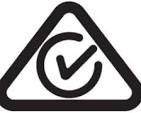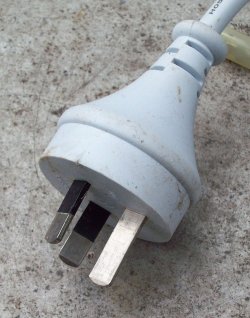markis10
Veteran Member
- Joined
- Nov 25, 2004
- Posts
- 30,741
- Qantas
- LT Gold
One of the key areas of change in recent times is USB charging, an area full of jargon, traps and potentially life ending scenarios.
First and foremost is electrical safety. In order to sell a charger, power supply or AC adaptor in Australia the device needs to be certified as electrically safe.

The Regulatory Compliance Mark (RCM) is a mark that indicates that electrical equipment is safe and compliant with Australian standards.
What does the RCM mean?
Many of the travel chargers available via EBay, Ali Express and Amazon don’t have this mark. Another common indicator of non compliance is the lack of insulation on the AC prongs designed to avoid electrocution of little fingers jammed into an AC socket.

So that’s the electrical safety aspect covered, one of the first things insurers look at in a claim.
What’s the best charger?
USB C is fast becoming the predominate standard, thanks to the EU mandating one type of connection. Many USB C devices are low power, 10-15 watts. However in the last year we have seen the advent of GAN chargers from 35W - 100W or even more. So what is GAN, Gallium nitride is basically a more efficient way of converting power with less heat loss, so all of a sudden we can power a laptop requiring 100W of power from an adaptor 30cm x 20cm, rather than the bricks of years gone by.
Given 35-65W GAN chargers are now available for $10 to $35, an easy solution for travel is a 4 way power board with a plug adaptor and a couple of cheap locally purchased, certified GAN chargers.
Now you’re probably wondering about powerbanks. Lithium Iron batteries have changed the world as we know it and it’s fair to say the revolution is just starting. But as frequent flyers we need to be mindful of the dangers and the regulations when it it comes to carrying powerbanks for our devices.
Rather than reinvent the wheel, I will refer readers to this very good guide on what’s legal when it comes to airlines:

 www.ozbargain.com.au
www.ozbargain.com.au
With phones, laptops, cameras, drones, and speakers, these days we are reliant on portable battery packs, or “power banks”. Unfortunately, batteries can cause sudden fires. Therefore, airlines have strict legal requirements about how batteries are transported.
Note: While this post is accurate, to the best of my knowledge, as of 31/05/2023: You are responsible for your own research. For the Civil Aviation Safety Authority’s most up-to-date guidelines regarding batteries, visit the CASA website(casa.gov.au).
Safe travels, and be safely fully charged
First and foremost is electrical safety. In order to sell a charger, power supply or AC adaptor in Australia the device needs to be certified as electrically safe.

The Regulatory Compliance Mark (RCM) is a mark that indicates that electrical equipment is safe and compliant with Australian standards.
What does the RCM mean?
- The RCM means the product has been tested and meets Australian standards
- The RCM shows that the equipment is linked to a responsible supplier
- Importers and manufacturers in Australia and New Zealand
- Registered Responsible Suppliers of Level 1, 2, or 3 electrical equipment

So that’s the electrical safety aspect covered, one of the first things insurers look at in a claim.
What’s the best charger?
USB C is fast becoming the predominate standard, thanks to the EU mandating one type of connection. Many USB C devices are low power, 10-15 watts. However in the last year we have seen the advent of GAN chargers from 35W - 100W or even more. So what is GAN, Gallium nitride is basically a more efficient way of converting power with less heat loss, so all of a sudden we can power a laptop requiring 100W of power from an adaptor 30cm x 20cm, rather than the bricks of years gone by.
Given 35-65W GAN chargers are now available for $10 to $35, an easy solution for travel is a 4 way power board with a plug adaptor and a couple of cheap locally purchased, certified GAN chargers.
Now you’re probably wondering about powerbanks. Lithium Iron batteries have changed the world as we know it and it’s fair to say the revolution is just starting. But as frequent flyers we need to be mindful of the dangers and the regulations when it it comes to carrying powerbanks for our devices.
Rather than reinvent the wheel, I will refer readers to this very good guide on what’s legal when it comes to airlines:

Flight Safe Power Banks / Battery Packs by Wh & Australian Airline
With phones, laptops, cameras, drones, and speakers, these days we are reliant on portable battery packs, or “power banks”. Unfortunately, batteries can cause sudden fires. Therefore, airlines have strict legal requirements about how batteries are transported.
Note: While this post is accurate, to the best of my knowledge, as of 31/05/2023: You are responsible for your own research. For the Civil Aviation Safety Authority’s most up-to-date guidelines regarding batteries, visit the CASA website(casa.gov.au).
Quick Reference Table
| 5,000 | 19 | Safe to carry-on |
| 10,000 | 37 | Safe to carry-on |
| 15,000 | 56 | Safe to carry-on |
| 20,000 | 74 | Safe to carry-on |
| 25,000 | 93 | Safe to carry-on |
| 27,000 | 100 | Limit without airline approval |
| 30,000 | 111 | Seek airline approval |
| 35,000 | 130 | Seek airline approval |
| 40,000 | 148 | Seek airline approval |
| 43,000 | 160 | Legal limit |
| 45,000 | 165 | Illegal to bring on plane |
[th]
mAh
[/th][th]Wh
[/th][th]Status
[/th]Safe travels, and be safely fully charged













